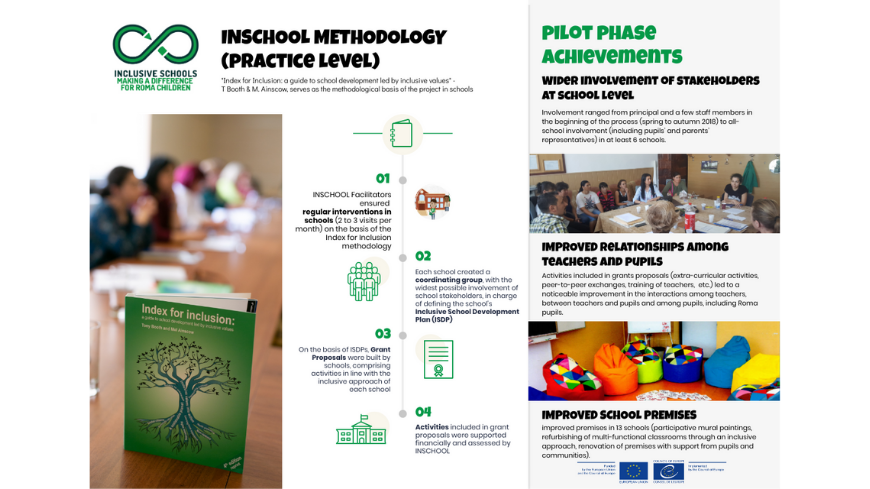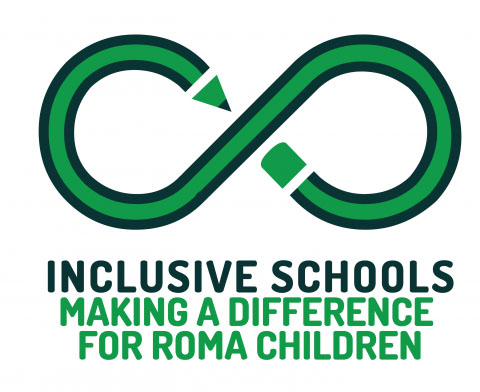Since 2010, the Roma inclusion priority has been increasingly present on the policy agenda of the European Union and Council of Europe. In this context, both the European Union and the Council of Europe have identified education as a key element to foster social inclusion. The INSCHOOL Joint Project of the two aforementioned institutions comes as a support to the implementation of EU’s “Paris Declaration of 17 March 2015 on promoting citizenship and the common values of freedom, tolerance and non-discrimination through education”, as well as the “Council Recommendation of 22 May 2018 on promoting common values, inclusive education, and the European dimension of teaching”. Furthermore, the project was inscribed in the policy agenda of the Council of Europe, in support to the Thematic Action Plan on the Inclusion of Roma 2016-2019 and the newly adopted Strategic Action Plan for Roma and Traveller Inclusion 2020-2025 – priority 5.3 Supporting access to inclusive quality education and training, ' While a number of measures and initiatives have already been implemented enabling progress in reducing early school dropout and improving early childhood education, important challenges remain, in particular to eliminate segregation in education through inclusive education.
During its pilot phase, the European Union and Council of Europe Joint Project “Inclusive Schools: Making a difference for Roma children” (INSCHOOL) aimed at enhancing social inclusion of Roma by promoting inclusive education and training in selected national schools in the Czech Republic, Hungary, Romania, the Slovak Republic and the United Kingdom. During the implementation period, the methodology used in schools was the “Index of Inclusion: a guide to school development led by inclusive values” by Tony Booth and Mel Ainscow (4th edition). The Index served as the basis for the intervention of INSCHOOL experts in schools and the development of Inclusive School Development Plans (ISDPs) – a vision of inclusion developed by schools using a tailor-made approach.
The intended outcomes of the Project were:
- Support mechanisms and resources for pilot inclusive schools are set up;
- Support to teachers is provided to promote inclusion and to improve the learning outcomes of Roma children;
- Support is provided to remove concrete barriers for vulnerable groups including through stronger partnerships within a country;
- Awareness of the benefits of inclusive education is raised among the general public as well as decision makers;
More information on the levels of intervention of the project here >>
ACHIEVEMENTS AT PRACTICE LEVEL
The INSCHOOL Joint Project was implemented in 25 schools in five countries over a period of 10.5 months (on average) during which the methodology was introduced and followed by schools with the guidance of INSCHOOL Educational Advisors and Facilitators. Each school created a Coordinating Group - comprised of teaching and non-teaching staff, parents and student representatives - and adopted an Inclusive School Development Plan (ISDP), on the basis of which INSCHOOL grants were disbursed. As a result, by the end of the project, most schools’ environment was visibly improved. This was possible through:
- the participative approach in involving a maximum range of stakeholders at school level (teaching staff, non-teaching staff, pupils and parents) through project methodology and grant activities; this contributed to improved relationships among pupils and between pupils and teachers mainly and to transforming schools into more friendly learning environments;
- the training of teachers, and sometimes entire school staff, according to the needs defined by the coordinating groups; there was a real added value identified in the whole-team training approach, which enabled teaching staff to have a common understanding of the Index and the inclusive approach;
- the subsequent involvement of the teaching staff in grant activities as well as their participation in national workshops and National Working Groups (SK), which contributed significantly to improved relationships among teaching staff;
- in-country study visits (peer-to-peer exchanges) and one international study visit, contributed to the creation of a community of practice, where teachers not only learned from the experience of other schools in similar contexts, but also transposed the knowledge gained into concrete actions within their schools;
- the introduction of support schemes to learners who are lagging behind, based on local needs, had an impact on the improvement of their learning outcomes and promoting their social mobility;
- the increased involvement of parents in non-formal activities, including workshops and awareness raising on various topics;
- the promotion of non-formal education, with an inclusive approach: school organised various events in 4 out of 5 countries focusing on awareness raising, field trips (including to high-profile remembrance locations, such as Auschwitz-Birkenau), lectures and debates on Roma history and culture;
- improved school premises through grant-financed activities (participative mural paintings, refurbishing of multi-functional classrooms through an inclusive approach, renovation of premises with support from pupils and communities); that contributed to transforming schools into more friendly learning environments;
While the INSCHOOL Joint Project targeted schools, with the aim of improving the learning environment of all children, a particular attention was paid to the way in which Roma children were included in all school activities. By the end of the project, it became clear that the methodology combined with the activities covered by INSCHOOL grants, as well as any other action taken by schools as part of their ISDP had a positive impact on Roma children.
ACHIEVEMENTS AT POLICY LEVEL
In close cooperation with the Ministries in charge of education in each country, a National Working Group works at policy level on the gaps and inconsistencies between existing policies and practices in schools, providing assistance in addressing them. In this way, inclusive practices in education are sustained by inclusive national policies.
National Working Groups (NWG) were created specifically for the INSCHOOL project in Hungary and Slovak Republic while dialogue with national authorities in the remaining countries was established in a different format. During the pilot phase, via national working group meetings and regular contacts with Ministries in charge of education, strong cooperation was established in each of the project countries as well as with relevant stakeholders - School Inspectorates, Institutes for Teachers’ Training or Institutes in charge of schools’ measurement and evaluation, but also Roma civil society.
Furthermore, the visit of the President of Romania took place to Ferdinand I Elementary and Secondary School - one of the INSCHOOL schools in Romania where the positive impact of INSCHOOL was highlighted. By the end of 2019, a Ministerial Order on School Segregation Monitoring was issued by the Ministry of Education and Research in Romania which approved its Methodology in pre-university education. It includes a large share of the Indicators used by the INSCHOOL Joint Project: “the Index for Inclusion”.
AMBASSADORS FOR INCLUSIVE SCHOOLS
INSCHOOL Project has strived to promote successful examples of persons affected by inclusive education and achieving great educational results by creating the role of Ambassador for Inclusive Schools. During the implementation of the project, one Ambassador for Inclusive Schools was selected, with his story created in the form of a comic story, that was disseminated in all project countries. The Ambassador has been active in countries during workshops and meetings in the Slovak Republic and the United Kingdom. The feedback from the beneficiaries was highly positive and the role of ambassadors will continue to be utilized on a wider scale in the future.


